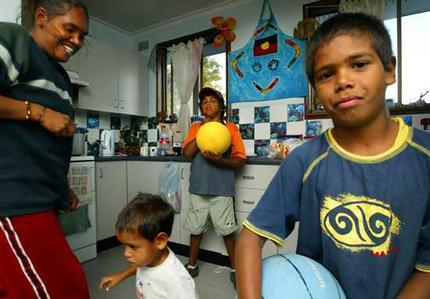
A
millionaire? Brenda Simon, of Bolton Point near Lake Macquarie, scoffs at
the suggestion. |
| They own real estate worth up to $3 billion, but thousands
of NSW Aborigines are missing out as shadowy development deals are made over
their land, some involving secret payments. About 135,000 indigenous people should be sharing wealth from vast holdings,
given as compensation for their losses through colonisation. But instead,
a Herald investigation has found: * Some developers are exploiting land councils' naivety over the true value of their holdings; * Land councils have signed joint ventures where most of the risk is carried by the council and much of the profit goes to the developer; * Some property-hungry developers even help land councils spot and claim crown land, so they can exploit it together. The investigation found that one Sydney land council was so mismanaged that it needs to sell a nine-hectare bayside site to pay off debts incurred, and that three of its executive members were paid more than $25,000 by a coalition of powerful developers. On Lake Macquarie, more than $2 million was raised in mortgages on land to fund a development on the site of the old Morisset psychiatric hospital. Three years later, it had all gone in fees, commissions and interest. |
| Among those who got the money were the then local land council chairman,
Bill Smith, the late Aboriginal activist and entrepreneur Charles Perkins,
his son, Adam Perkins, a Sydney accountant, Graham Steer, and former NSW
Liberal MP Bob Scott. All have declined to comment to the Herald.
The Independent Commission Against Corruption is investigating property deals
at the following land councils: Koompahtoo (the Morisset deal); Worimi,
near Port Stephens; and Ngunnawal, near Queanbeyan.
At Worimi, a twice-bankrupt, struck-off solicitor, George Adler, was able to obtain a $300,000 unsecured loan from the land council, which is now taking legal action to recover the money. Adler had been paid as a consultant to developers who have bought the first right to purchase 120 hectares of waterfront land. |
| At least six coastal land councils are being forced to sell granted land
after losing money in disastrous deals with developers' representatives
or running up debts through onerous local government rates. They are Illawarra,
La Perouse, Koompahtoo, Worimi, Kempsey and Purfleet-Taree land councils.
The land council watchdog, the Office of the Registrar of the Land Rights
Act, is investigating individuals at three other councils for alleged dishonesty.
About 79,000 hectares of former public land has been given to Aborigines over the past 21 years through the NSW Land Rights Act. Once unwanted and neglected, it is now estimated to be worth between $740 million and $3 billion. It includes some of the last tracts of prime, undeveloped land along the coast. |
| Though some of the development deals are beneficial, much of the windfall
has been locked up in a land council system that many acknowledge is broken.
The holdings are controlled by 122 democratically elected land councils, but they are often ruled by a few family-centred factions who enter talks with developers that can exclude many fellow council members. Eleven local land councils - almost 10 per cent of the total - are under administration. Warren Mundine, the Labor Party's federal vice-president and head of its NSW indigenous policy committee, said the state Minister for Aboriginal Affairs, Andrew Refshauge, was partly to blame. "If you were an X-filer and a bit paranoid about things, you'd say the system has been deliberately set up to keep us in poverty," Mr Mundine said. "You are talking about millions of dollars for the most disadvantaged and alienated people in Australia. We can't afford to lose a cent, let alone millions." |
| Stephen Wright, the registrar of the Land Rights Act, said the State
Government had already recognised the need for reform and had appointed him
chairman of a taskforce to overhaul the legislation.
Dr Refshauge said: "I think it is really important that we do have a serious overhaul now. That is what we have started the taskforce to do ... My concern on this is that there is good and bad developers looking for land to be developed and people without great expertise in dealing with them have quite significant pressures on them." |
| Murray Chapman, the administrator of the NSW Aboriginal Land Council, said the legislation was dysfunctional. Informed consent was not being given to some deals. "Aboriginal people live on the margins of our economy and to a lot of [them] the most substantial commercial transaction we have been involved in is the purchase of a motor car. Developers, on the other hand, have years and years of experience in the world of high finance." |
